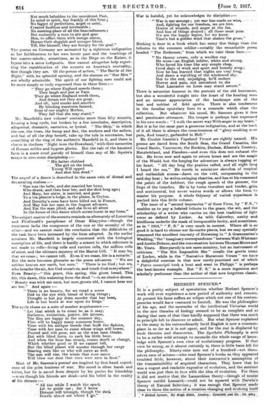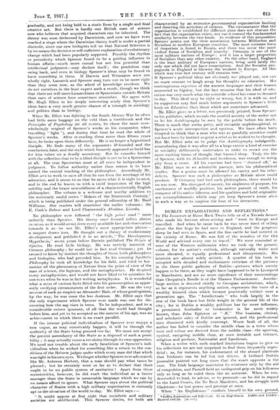HERBERT SPENCER.*
IT is -a pretty subject of speculation whether Herbert Spencer's work will ever experience a new period of authority and renown. At present his fame suffers an eclipse which not one of his contem- poraries would have ventured to foretell. He was the, philosopher of his age, and the surrender of the intellectual Victorian world to the new theories of biology seemed to be so complete and so daring that men of that time hardly supposed that there was much in principle left to discover or admit. But what Spencer explained to the many in his extraordinarily lucid English is now a common- place in so far as it is not upset, and for the rest is displaced by fresh theories and discoveries. The Synthetic Philosophy is seen to be a rather wild attempt to reconcile the whole range of know- ledge with Spencer's own view of evolutionary progress. If that view be wrong, as it almost certainly is, there is little basis left for the philosophy. Ninety-nine men out of a hundred—not them- selves men of scienco—who read Spencer's books as they appeared troubled little, however, about their instructor's assumption of the transmissibility of acquired characters. They knew that he was a cogent and readable expositor of evolution, and the sentient world was just then in love with the idea of evolution. For them it did not matter that, the Lansarckian theory—though of course Spencer outdid Lamarck—could not be squared with Darwin's theory of Natural Selection,; it was enough that Spencer made dear to them the notion of a creation changing and evolving itself • "Marled Spencer. By Stgh Elliot.. Leaden: Quotable And Co. tat,. aot..1
gradually, and not being held to a static -form by a single and final creative act. But there is hardly one British man of science now who believes that acquired characters can be inherited. The theory was soon dethroned by Darwinism, and now we have even reached a stage where the Darwinian theory itself is under a partial discredit, since our new biologists tell us that Natural Selection is by no means the decisive or self-sufficient explanation of evolutionary change which had been popularly supposed. Possibly the rhythm or periodicity which Spencer found to be a guiding influence in human affairs—much more casual but not less powerful than intellectual judgment—may declare itself ; the pendulum may swing back, and oven in biology Spencer's ideas may be found to have something in them. If Darwin and Woismann were not wholly right, Lamarck and Spencer may, turn out to be more right than they seem now, as the wheel of knowledge revolves. We do not ourselves in the least expect such a result, though we think I hat there are still more Lamarckians or Spencerians outside Britain than men of science here sometimes remember. We agree with Mr. Hugh Elliot in his deeply interesting study that Spencer's ideas have a very much greater chance of a triumph in sociology and politics than in biology.
When Mr. Elliot was fighting in the South African War he often had little more baggage on the veld than a toothbrush and the Principles of Psychology (at all events, he chose the most over- whelmingly original of Spencer's works as his companion when travelling " light "), and during that time he road the whole of Spencer's works. After re-reading them more than fifteen years later, ho looks upon them differently. He is no longer a hypnotized disciple. Ho finds many of the arguments ill-founded and the conclusions false, and the style which formerly appeared so lucid has for him taken on a deadly monotony. But ho consoles himself with the reflection that to be a blind disciple is not to be a Spencerian at all. The true Sponcerian must at all costs be independent in judgment. To follow authority rather than reason is to have missed the central teaching of the philosopher. Accordingly Mr. Elliot sets to work to save all that ho can from tho wreckage of his adoration, and it seems to us that ho saves what it is right to save, and in the end he leaves us with a vivid impression of the high nobility and the brave unworldliness of a characteristically English philosopher. Tho volume is a welcome and worthy addition to the extremely useful series " Makers of the Nineteenth Century," which is being published under the general editorship of Mr. Basil Williams. Our readers will remember the earlier volumes : Sir E. Cook's Delane and Lord Charnwood's Abraham Lincoln.
No philosopher ever followed " the high priori road " more ardently than Spencer. His theory once formed (often almost in vacua, as it would seem) drew every available fact and observation towards it as—to use Mr. Elliot's most appropriate phrase — a magnet draws iron. Ho thought out a theory of evolutionary development and published it in an article, Tho Development. Hypothesis," seven years before Darwin published The Origin of Species. He read little biology. He was entirely innocent of Gorman philosophy ; ho could not in fact road German ; yet ho seemed to know by instinct the thoughts of those, both philosophers and biologists, who had preceded him. In his amazing Synthetic Philosophy be took all knowledge for his field, and tried to has - monize all the phenomena of Nature from the point of view of the man of science, the logician, and the metaphysician. Ho despised every metaphysician, and would not have liked to be mistaken for one oven when he was in fact writing metaphysics. It is wonderful what a mass of various facts fitted into his preconception as appar- ently verifying circumstances of the first order. He was the very reverse of such an empiric as Alexander Bain, of whose good opinion, by the way, he was none the less desirous. Mr. Elliot says that the only experiment which Spencer ever made was one for dis- covering how the sap rises in trees. To be independent, and to a considerable extent ignorant, of all that the world had thought before him, and yet to ho accepted as the mentor of his age, was an achievement to which there is no exact parallel.
If the intense political individualism of Spencer ever enjoys a now vogue, as may conceivably happen, it will be through the authority of the State being pressed too far. We must not accept the present ascendancy of the State as a disproof of such a possi- bility ; it may actually cause a revulsion through its own oppression. We need not trouble about the early fanaticism of Spencer's indi- vidualism when he wished for something like a return to the con- ditions of the Hebrew judges under which every man did that which was right in his own eyes. We forget whether Spencer ever advocated, like Mr. Auberon Herbert, that a man should pay what taxes he pleased ; but he certainly went so far as to declare that there ought to be no public system of sanitation ! Apart from these eccentricities, however, lie did exalt the individual as a better manager than the State in memorable language which we can by no means afford to ignore. What Spencer says about the political character of States with a high military organization is curiously apt to the situation of the world to-day. Mr. Elliot says :— " It might appear at first sight that socialistic and military societies are antithetical. This Spencer denies, for both are characterised by an extensive governmental organisation limiting and directing the activities of citizens. The circumstance that the organisation is established for different aims does not obscure the fact that the organisation exists, nor can it conceal the fundamental similarity between the two kinds. In evidence of this proposition Spencer points out the close association between Militarism and Socialism in modem European countries. The most extreme form of despotism is found in Russia, and there too occur the most violent forms of Socialism and anarchy. Germany is one of the most military nations of Europe ; and it has a larger proportion of Socialists than any other country. On the other hand, England is the least military of European nations, being until lately tho only one which did not have conscription. And the Socialist pro- paganda in England is likewise the weakest in Europe. All this which was true last century still remains true."
If Spencer's political ideas are obviously not played out, one can no more venture to laugh away his thoughts on education. His contemptuous rejection of the ancient languages and their lessons amounted to bigotry, but the fact remains that his ideal of edu- cation was very much what the scientific school has come to demand to-day. This ideal may be right or wrong, but it is with us, and its supporters may find much better arguments in Spencer's little book on Education than those which are sometimes advanced.
Mr. Elliot gives us a letter, not previously printed, from Spencer to his publisher, which reveals the morbid anxiety of the writer not to let his Autobiography be seen by the public before his death. Those is much that seems petty, and certainly unphilosophieal, in Spencer's acute introspection and egotism. We have often been tempted to think that a man who was so painfully sensitive could not have been by instinct so great. a rebel as he wished to be thought. But Mr. Elliot asks us to judge the Autobiography indulgently, remembering that it was after all to a large extent a kind of exercise in triviality deliberately undertaken in order to crowd out the more exciting forms of thought that banned sloop. Truly the life of Spencer, with its ill-health and loneliness, was enough to wring pity from a stone. All his emotion had been " drained off," as Mr. Elliot says in an admirable passage, into his philosophical studies. But a genius must be allowed his vanity and his other defects. Spencer was such a philosopher as Britain alone could produce. If Germany had had such philosophers, there would ho no war now. His disregard of money, his singleness of purpose, his carelessness of worldly position, his ardent pursuit of truth, his conquest of his native idleness, and his qualities and bold originality are accomplishments which may yet. keep Spencer's name alive in such a way as to surprise the host of his detractors.



























 Previous page
Previous page